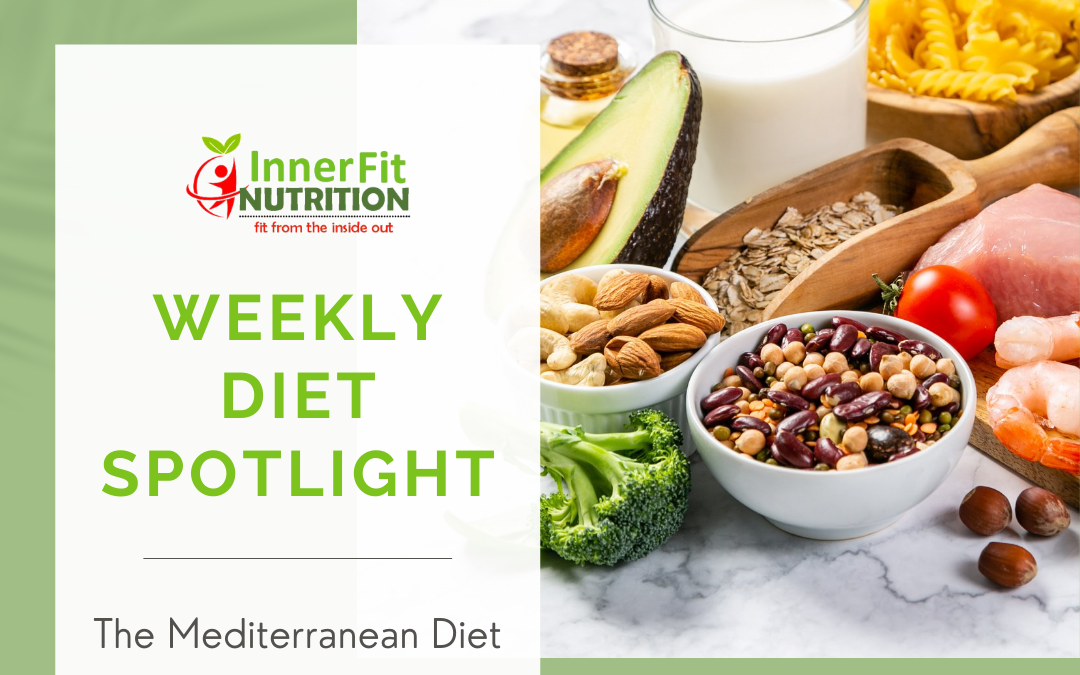What if dieting was not all about restriction and deprivation?
That’s what a maintainable diet should be like, and the Mediterranean diet is a prime example of this. Let’s take a look at how we can enjoy our favourite foods (including a glass of red) and still maintain an optimal weight and overall health.
So, what Exactly is the Mediterranean Diet?
The Mediterranean diet is one of the most researched and acknowledged diets worldwide. It’s based off the premise of traditional eating habits surrounding the Mediterranean Sea, which share some basic dietary principles (1). The main dietary principles include:
- Predominantly a plant-based cuisine packed with vegetables, fruits, grains, nuts, legumes, herbs and spices. A typical plate on the Mediterranean diet should be bursting with colour.
- An emphasis on healthy fats, focusing on unsaturated and omega-3 fats. Extra virgin olive oil is seen as the golden option, with other healthy fats highlighted such as avocado, nuts and seeds, oily fish, walnuts, chia seeds and flax seeds.
- Highlighting fish as the main protein source at least twice per week, and integrating other proteins such as poultry, dairy and eggs in between. Red meat is advised in small quantities. Interestingly, meat is often not the main component of the meal, much like western eating patterns. Rather, it becomes a side dish or component of an integrative plant-based meal.
Overall, these principles align with Inner Fit Nutrition. An abundance of plant-based foods, along with healthy fats and protein is the way we recommend the majority of our clients to eat. Not only is it healthful, but also nourishing, maintainable and allows for balance. However, what is the research saying?
The Benefits
As we mentioned above, the Mediterranean diet is one of the most studied diets since its recognition in the 1960’s (1). Many intervention and observational studies have consistently found that the Mediterranean diet is associated with lower disease outcomes due to a variety of mechanisms (2). Here are some of the evidence-based benefits we have extrapolated…
1. Reduces risk of cardiovascular disease, heart disease & stroke.
Reduces risk of cardiovascular disease, heart disease & stroke. The abundance of plant-based foods in combination with a reduced intake of red meat and alcohol all contribute to the lowered risk of developing chronic disease of the heart.
2. Is successful in aiding long-term weight loss, preventing overweight and obesity.
Plant-based foods are generally lower in calories, therefore it is easier to maintain a caloric deficit whilst still feeling full, satisfied and energised after meals – what a win-win situation!
3. Improves cognition and reduces risk of cognitive impairment and neurodegenerative diseases.
Eating a Mediterranean style diet is actually associated with a halved risk of Parkinson’s disease (3). This is due to the abundance of antioxidants found throughout the diet, which act by preventing cells going under oxidative stress (3).
4. Is linked to greater longevity and lower risk of all-cause mortality.
In fact, studies are showing that the Mediterranean diet is linked to a reduced risk of mortality by 20% (3). Sign me up!
5. Keeps you strong and agile throughout all life stages.
The Mediterranean diet has been shown to maintain muscle mass and reduce risk of muscle weakness significantly. This means that you will be more agile and reduce frailty while you age.
So, Should you Try the Mediterranean Diet?
Overall, the Mediterranean diet speaks wonders for not only long-term health outcomes, but also individual satisfaction. This has been proven through an abundance of long-term studies as outlined above.
By moving more towards a Mediterranean style diet or by simply integrating some of the principles into your diet, you are moving toward a life full of health and vitality. A few easy ways to do this is to replace your vegetable oils or butter in cooking for extra virgin olive oil, add more fresh fruits and veggies into your diet and replace your meat-rich meals with fish at least twice per week. Need extra support? Don’t fret, you can always book an Initial Nutrition Consultation with Amanda so that you can learn how to integrate the Mediterranean diet long-term.
Written by:
Mollie Caughey-Wade,
Clinical Nutritionist (BSc).

